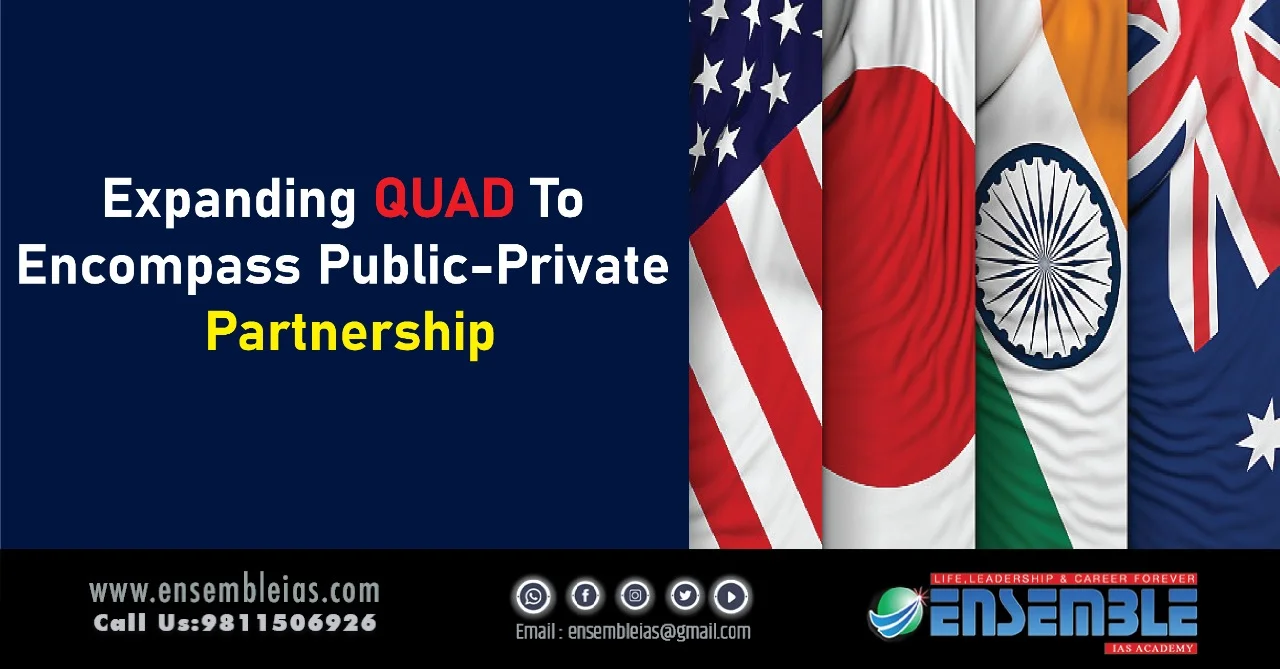Expanding Quad to encompass public-private partnership:
External affairs minister S Jaishankar’s ongoing visit to the United States (US) is focused on how the two countries can work to find solutions to global issues, with the pandemic and vaccines topping the list. That message — coming ahead of the G-7 summit in June and an expected in-person summit meeting of the Quadrilateral Security Dialogue (Quad) later this year — acknowledges how US-India cooperation in response to Covid-19 provides a template for regional cooperation in the Indo-Pacific and beyond.
To buy our online courses: Click Here
The evolution of Quad reinforces a broader reality as the world confronts the coronavirus pandemic. While the revival of the arrangement, termed Quad 2.0, is motivated by geopolitical and defence imperatives in the Indo-Pacific, it has natural roots as a template for structured cooperation in non-military domains, including humanitarian assistance and disaster relief that can and should run parallel to and strengthen the wider geopolitical agenda. This soft power element harks back to Quad’s origins as a response to the Asian tsunami in 2004.
Recent Covid-19-focused bilateral cooperation between the US and India further testifies to the importance of this humanitarian aspect. When the US was encountering a spike of Covid-19 infections in 2020, India pitched in by providing personal protective equipment (PPE) kits, masks and disposables as well as mobilising the production of hydroxychloroquine by Indian drug manufacturers. This support was deeply appreciated by Americans and the US government.
In a back-to-the-future moment in Quad, India is now facing a tsunami-level challenge from a second wave and the US has responded in kind, mobilising aid. The US government, American companies and the Indian-American community have coordinated efforts and provided oxygen tanks, oxygen generators, drugs and disposables as well as technical support.
A defining feature of this two-way collaboration is the contribution from corporations and industry associations in both countries to support their respective government initiatives. The sense of responsible business playing a core role in international humanitarian and disaster relief – that is compassionate and rises to the needs of the moment – will define the new corporate social responsibility paradigm and should be sustained by a more structured public-private partnership.
The experience of regional cooperation during the 2004 tsunami became the cornerstone of geopolitical interactions among the four democracies in the Indo-Pacific. Later, it also evolved as a keystone building block of trust enabling a strengthened US-India defence partnership. Deepened trust resulted in new annual military exercises, trade and technology initiatives that would not have been possible just years earlier.
This new level of public-private coordination is a win-win strategy for all stakeholders in the US-India relationship. It also provides apt balance to the heretofore more dominant defence and trade narratives. This effort should be extended to Quad. Doing so will benefit all the four democracies with enhanced capacity, shared best practices, advanced research and shared experience for an immediate response to any emergency that requires humanitarian aid and disaster management.
Such cooperation should then be expanded as needed to support countries in need across the Indo-Pacific. Covid-19 vaccine and drug development and production, already embedded in the Quad agenda, is an obvious starting place for a private-public partnership incorporating the US, India and others.
Also Read: Today’s informational politics
Building on the momentum of Jaishankar’s visit this week, the time is right to take this US-India relationship innovation regional, particularly elevating the private-public level cooperation to Quad. Stakeholders should shape the evolving agenda as momentum builds for the first-ever Quad in-person summit. Key members of the private sectors of the Quad countries should be invited to join a discussion with the leaders and prepare for the summit with their government counterparts.




